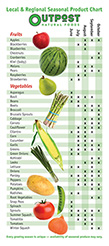No Comparison: Cooperatives Versus Traditional Retail

A recent study released by the National Cooperative Grocer’s Association (NCGA) should make you feel pretty good about shopping at Outpost.
Why? 
Well, because the report underscores the many ways that coops surpass the competition when it comes to creating economic and social impact on their communities.
That’s no surprise, right?
Well, that’s true. But, you might be surprised by some of the cold, hard statistics.
For example, did you know that for every $1,000 a shopper spends at their local food co-op, $1,604 in economic activity is generated in their local economy—$239 more than if they had spent that same $1,000 at a conventional grocer?
Even more dramatically, a co-op with $10 million in annual sales generates $16 million of local economic impact. A conventional grocery store of the same size, in the same community, would have an annual economic impact of $13.6 million – meaning that simply by choosing to support and shop at a food co-op, a community can increase its total economic activity by over $2.4 million a year.
That’s because coops support LOCAL.
Where conventional grocers work with an average of 65 local farmers and food producers, food co-ops work with an average of 157. Likewise, locally sourced products make up an average of 20 percent of co-op sales compared to 6 percent at conventional stores. Two thirds of NCGA co-ops define local as either within their state, within a multi-county region, or within 100 miles. In the conventional grocery sector, slightly less than half of operators use this same definition.
And coops think about their environmental impact.
Co-ops recycle 96 percent of cardboard, 74 percent of food waste and 81 percent of plastics compared to 91 percent, 36 percent and 29 percent, respectively, recycled by conventional grocers.
Best of all, they win with organics.
And did you know that, when it comes to organic foods, coops win every time? Conventional stores actually won’t do you much good if you’re trying to switch over to organic. In fact, only 12% of the produce they sell is organic. At co-ops, a whopping 82% of the produce sold is organic. AND, at Outpost, 92% of the produce is organic!
Which means, comparing Outpost to another retail chain is like comparing… conventionally grown apples to organic peaches.
So, next time you consider where to spend your cash, consider supporting your local cooperative. There’s simply no comparison.
- Lori Fredrich, board member
Comments
Bloggers
Archived Columns
Tags
Archives
-
March 2024 (1)
February 2024 (1)
December 2023 (1)
August 2023 (1)
March 2023 (1)
February 2023 (1)
November 2021 (1)
September 2021 (1)
November 2020 (1)
October 2020 (1)
July 2020 (1)
June 2020 (1)
May 2020 (1)
February 2020 (1)
January 2020 (1)
December 2019 (1)
November 2019 (1)
October 2019 (1)
August 2019 (2)
May 2019 (1)
March 2019 (2)
January 2019 (1)
December 2018 (1)
November 2018 (1)
October 2018 (2)
September 2018 (1)
February 2018 (1)
November 2017 (2)
October 2017 (1)
July 2017 (2)
March 2017 (1)
February 2017 (1)
January 2017 (1)
December 2016 (2)
November 2016 (1)
August 2016 (2)
July 2016 (2)
March 2016 (2)
February 2016 (2)
January 2016 (1)
December 2015 (1)
October 2015 (3)
August 2015 (1)
July 2015 (2)
June 2015 (1)
March 2015 (2)
February 2015 (2)
January 2015 (2)
December 2014 (2)
November 2014 (1)
October 2014 (3)
August 2014 (2)
July 2014 (1)
June 2014 (2)
May 2014 (2)
April 2014 (1)
March 2014 (2)
February 2014 (2)
January 2014 (2)
December 2013 (1)
November 2013 (2)
October 2013 (1)
July 2013 (2)
June 2013 (1)
May 2013 (2)
April 2013 (1)
March 2013 (2)
February 2013 (1)
January 2013 (2)
December 2012 (3)
November 2012 (1)
October 2012 (3)
September 2012 (2)
August 2012 (4)
July 2012 (4)
June 2012 (6)
May 2012 (3)
April 2012 (4)
March 2012 (6)
February 2012 (8)
January 2012 (3)
December 2011 (4)
October 2011 (4)
September 2011 (3)
August 2011 (5)
July 2011 (7)
June 2011 (1)
May 2011 (2)
April 2011 (7)
March 2011 (10)
February 2011 (12)
January 2011 (11)
December 2010 (19)
November 2010 (13)
October 2010 (22)
September 2010 (16)
August 2010 (24)
July 2010 (33)
June 2010 (5)
May 2010 (52)
April 2010 (37)
March 2010 (55)
February 2010 (44)
January 2010 (46)
December 2009 (40)
November 2009 (26)
October 2009 (37)
September 2009 (34)
August 2009 (24)
July 2009 (21)
June 2009 (29)
May 2009 (30)
April 2009 (33)
March 2009 (16)
February 2009 (2)
January 2009 (5)
November 2008 (1)
October 2008 (1)
September 2008 (2)
August 2008 (3)
July 2008 (2)
June 2008 (6)
May 2008 (2)
April 2008 (10)
March 2008 (5)
February 2008 (5)
January 2008 (12)
December 2007 (5)
October 2007 (3)
August 2007 (3)
July 2007 (1)
June 2007 (5)
May 2007 (4)
April 2007 (6)
March 2007 (3)
February 2007 (3)
January 2007 (4)
December 2006 (2)
October 2006 (2)
September 2006 (5)
August 2006 (8)
0 (1)










